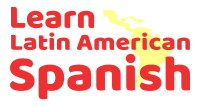|
Learn Venezuelan Spanish: A Quick Language Course (Audiobook)
This is your introduction to Venezuelan Spanish, including unique Venezuelan words and idioms and an introduction to Venezuelan customs. This is paired with introductory Spanish as used in Venezeula. This course will help prepare you for work or travel in Venezeula. Topics covered include culture, food, customs, and detail on pronunciation and basic grammar. Vocabulary is organized thematically across a range of topics including numbers, colors, weather, questions, verbs, greetings, manners, animals, vehicles, places, and many more words and phrases that you can put to use daily. The content is grouped into ten sessions. |
An Overview of Venezuelan Spanish
Native speakers: 31 million.
Venezuelan Spanish refers to the Spanish spoken in Venezuela.
Spanish was introduced in Venezuela by colonists. Most of them were from Galicia, Basque Country, Andalusia, or the Canary Islands. The last has been the most fundamental influence on modern Venezuelan Spanish, and Canarian and Venezuelan accents may even be indistinguishable to other Spanish-speakers.
Italian and Portuguese immigrants from the late 19th and the early 20th century have also had an influence; they influenced vocabulary and its accent, given its slight sing-songy intonation, like Rioplatense Spanish. German settlers also left an influence when Venezuela was contracted as a concession by the King of Spain to the German Welser banking family.
The Spaniards additionally brought African slaves, which is the origin of expressions such as chévere ("excellent"), which comes from Yoruba ché egberi. Other non-Romance words came from indigenous languages, such as guayoyo (a type of coffee) and caraota (black bean).
There are several subdialects of Venezuelan Spanish:
The Andean dialect, particularly in the state of Táchira, near the Colombian border, is characterized by a nonaspirated pronunciation of 's', and use of usted instead of tú even in informal contexts. Another variant, in the states of Mérida and Trujillo, still uses usted instead of tú, but has the aspirated pronunciation of /s/ as a voiceless alveolar retracted sibilant [s̺], also called apico-alveolar or grave, between [s] and [ʃ]. That phonetic trait, unique in the Americas, is from the large number of northern Spanish settlers in Andean Venezuela.
The Central dialect, a characteristic marked accent whose use is very common in cities like Caracas, La Guaira, Los Teques, Maracay and Valencia. This dialect is the basis of standard Spanish of Venezuela.
The Guaro or Larense dialect, spoken initially in Barquisimeto, Cabudare, El Tocuyo and Quíbor, spread throughout the state of Lara and other Central-Western states. In it, the older Spanish verbal inflections -ades, -edes, -odes have become -ás, -és, and -ós:" [5] "vos cantáis", "vos coméis", "vos sois."
The Llanero (plainman) dialect is spoken in the Venezuelan plains. One of its characteristics is a considerable aboriginal lexicon, a product of the fusion of both languages
The Margaritan dialect (oriental), spoken in Isla Margarita and the northeast of mainland Venezuela. The Margaritan dialect sometimes has an interdental for pre-vowel 's', and uses a strong 'r' instead of 'l' for most words.
Source: Wikipedia
Venezuelan Spanish refers to the Spanish spoken in Venezuela.
Spanish was introduced in Venezuela by colonists. Most of them were from Galicia, Basque Country, Andalusia, or the Canary Islands. The last has been the most fundamental influence on modern Venezuelan Spanish, and Canarian and Venezuelan accents may even be indistinguishable to other Spanish-speakers.
Italian and Portuguese immigrants from the late 19th and the early 20th century have also had an influence; they influenced vocabulary and its accent, given its slight sing-songy intonation, like Rioplatense Spanish. German settlers also left an influence when Venezuela was contracted as a concession by the King of Spain to the German Welser banking family.
The Spaniards additionally brought African slaves, which is the origin of expressions such as chévere ("excellent"), which comes from Yoruba ché egberi. Other non-Romance words came from indigenous languages, such as guayoyo (a type of coffee) and caraota (black bean).
There are several subdialects of Venezuelan Spanish:
The Andean dialect, particularly in the state of Táchira, near the Colombian border, is characterized by a nonaspirated pronunciation of 's', and use of usted instead of tú even in informal contexts. Another variant, in the states of Mérida and Trujillo, still uses usted instead of tú, but has the aspirated pronunciation of /s/ as a voiceless alveolar retracted sibilant [s̺], also called apico-alveolar or grave, between [s] and [ʃ]. That phonetic trait, unique in the Americas, is from the large number of northern Spanish settlers in Andean Venezuela.
The Central dialect, a characteristic marked accent whose use is very common in cities like Caracas, La Guaira, Los Teques, Maracay and Valencia. This dialect is the basis of standard Spanish of Venezuela.
The Guaro or Larense dialect, spoken initially in Barquisimeto, Cabudare, El Tocuyo and Quíbor, spread throughout the state of Lara and other Central-Western states. In it, the older Spanish verbal inflections -ades, -edes, -odes have become -ás, -és, and -ós:" [5] "vos cantáis", "vos coméis", "vos sois."
The Llanero (plainman) dialect is spoken in the Venezuelan plains. One of its characteristics is a considerable aboriginal lexicon, a product of the fusion of both languages
The Margaritan dialect (oriental), spoken in Isla Margarita and the northeast of mainland Venezuela. The Margaritan dialect sometimes has an interdental for pre-vowel 's', and uses a strong 'r' instead of 'l' for most words.
Source: Wikipedia
Venezuelan Spanish Learning Books
|
Quick Guide to Venezuelan Spanish
This dictionary-style book of words and phrases helps you better understand Venezuelan Spanish and slang. The collection of more than 500 terms and sayings will help you become familiar with the richness of the country’s Spanish. It includes slang and vulgar words that you will likely run across in everyday conversations. Each term has been defined in English and synonyms are included when available. There are also more than 480 example sentences demonstrating how to use the words. You will be on your way to Venezuelan Spanish fluency with this phrasebook of Spanish vocabulary words from Venezuela. This book contains words that are not appropriate for kids. If you are just starting to learn Spanish, this book is best used as a complementary reference source to any program or class designed to teach you Spanish. This book and the other books of the Speaking Latino series are not designed as stand-alone learning aids, to teach you Spanish. Instead, they expand your country-specific Spanish vocabulary. If you already speak Spanish, this book help you understand local Spanish from Venezuela. |
|
Quick Guide to More Venezuelan Spanish
This book is the second volume about Venezuelan Spanish and vocabulary following the first book, Quick Guide to Venezuelan Spanish. More than 500 new vocabulary words and phrases are added to this second Venezuelan Spanish slang phrasebook. Each term has been defined in English and synonyms are included when available. In addition, there are also more than 450 example sentences demonstrating how to use the words. It includes 45 black and white illustrations. With this book, words like “perol,” "tobo,” "catire" and “zaperoco" will no longer be a mystery. As with the first volume, this volume also contains words that are not appropriate for kids. If you are just starting to learn Spanish, this book is best used as a complementary reference source to any program or class designed to teach you Spanish. |
|
Venezuelan Glossary for English speakers: A practical guide to understand Venezuelan slang words in English
Have you ever wondered how Venezuelans communicate on a daily basis? Have you ever traveled to Venezuela or met a Venezuelan and you don't know exactly what they mean when they're talking about anything? This glossary is for you. It is a simple and easy way for you to understand the different terms and expressions used by Venezuelans (Venezuelan Spanish) on a daily basis, translated using simple words in English. |
|
El Diccionario Venezolano: The most extensive collection of Venezuelan words, terms, idioms and expressions (Spanish Edition)
This book contains the widest compilation of words, expressions, idioms and Venezuelan expressions that have been made to date. It is a work of more than four years carried out by a Venezuelan team of linguists. An absolutely necessary book if you want to know more about the origin of the most important words in Venezuela. The book is a global collaboration, since it has been made with the testimonies and feedback of millions of Venezuelans. |
|
VENEZOLANISMOS (Venezuelan Slang): or words you must know to understand Venezuelan people (Spanish Edition)
This book is not meant to be a dictionary, it is just to give a little bit of clarity to the idioms of everyday speech, even people with good speaking know and have said in informality some of these words that I have collected in this work so that the foreign friend that is strange to our culture does not feel excluded or lost in a casual conversation, even words that in another country have a meaning, in Venezuela can mean something very different, so accept this little compendium I have done as my way of telling you: Welcome to Venezuela. |
Venezuelan Spanish Language Courses
|
1-on-1 Spanish tutoring at italki
One-on-one language tutoring at italki is hands down the most efficient way to reach language fluency. That's why it is the most popular platform today for learning a language online. You can practice conversational skills under different real-world scenarios with a native speaker tutor of your choice who provides you with undivided attention and customized lessons that cater to your learning needs and interests. Whether you’re at home, at the airport, or at your local park, you have complete access to learning Venezuelan Spanish or any other language you want with a native speaker from any country of your choice. SPECIAL OFFER: Get $10 italki credits by joining via this link. |
|
Spanish Uncovered: The World’s First StoryLearning Spanish Home Study Course
This new, science-based language learning method was invented by polyglot language expert Olly Richards, who has authored more than a dozen best-selling language books available in bookstores around the world and on Amazon.com. This was the method he used to learn eight languages, and is the exact same method he has been using to help thousands of students learn Spanish. The course comes in both Castilian and Latin American versions, which means that it works for you whatever variety of Spanish you're learning. Find out more! |
|
Baselang's Real World 1-on-1 Spanish tutoring
This top-rated program offers UNLIMITED 1-on-1 Spanish tutoring where you can take as many online Spanish classes as you want, on a daily basis if you wish, with their professional teachers from all around Latin America for a monthly flat rate. Baselang's classes are specifically tailored to your level, from zero to advanced. Don't miss this amazing opportunity! |
|
Preply
Preply is a global online language learning platform designed to promote faster learning with one-on-one online tutors. It connects language tutors with millions of learners from all over the world. You can choose from thousands of Spanish teachers from any country of your choice available in the platform. Book a lesson with a private Spanish teacher today and start learning. Not entirely happy with your tutor? No worries, Preply offers free tutor replacement till you're 100% satisfied. |
Venezuelan Spanish Learning Podcasts
|
Podcast on Venezuela by Lengalia
Listen to native speakers from Venezuela telling interesting facts about their country, culture and language in Venezuelan Spanish accent. |
Venezuelan Spanish Learning Blogs
|
40 Venezuelan Slang Words To Sound Like A True Venezolano
An excellent blog article on Venezuelan Spanish slang by Baselang. With Baselang's UNLIMITED 1-on-1 online Spanish tutoring you can take as many online Spanish classes as you want with their professional teachers for a monthly flat rate. Don't miss the opportunity! |
|
¡Epa! Learn This Venezuelan Slang to Speak Like a Local
A great blog article on Venezuelan Spanish slang by FluentU. |
|
Venezuelan Slang Terms
An awesome blog article on Venezuelan Spanish slang by Live Lingua. |
1-on-1 Venezuelan Spanish Lessons at italki
|
italki is the most flexible and affordable language learning platform that connects students with the most dedicated teachers around the world for 1-on-1 online language tutoring through video chat. At italki, you can choose an experienced Venezuelan Spanish teacher for your personal tutor based on your goals and interests.
Here is a step-by-step instruction to find a native Venezuelan Spanish teacher at italki:
Good luck and enjoy your lesson! |
Home | About | Contact Us | Disclosure | Privacy Policy
This page contains affiliate links. For more information, see our disclosure page.
Copyright © 2024 LearnLatinAmericanSpanish.com
This page contains affiliate links. For more information, see our disclosure page.
Copyright © 2024 LearnLatinAmericanSpanish.com



















